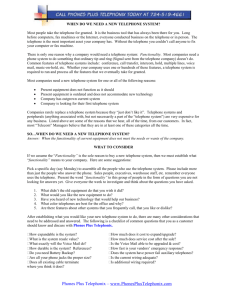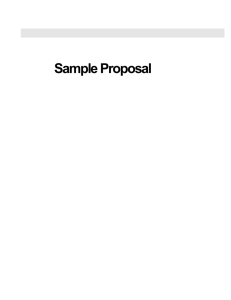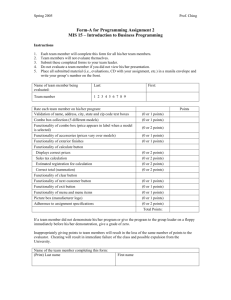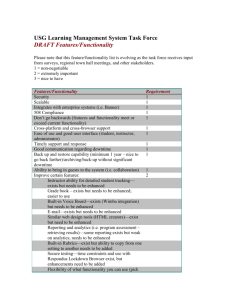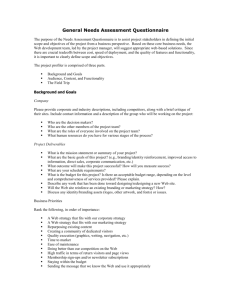Lecture5SocialAspectsII - Donald Bren School of Information
advertisement
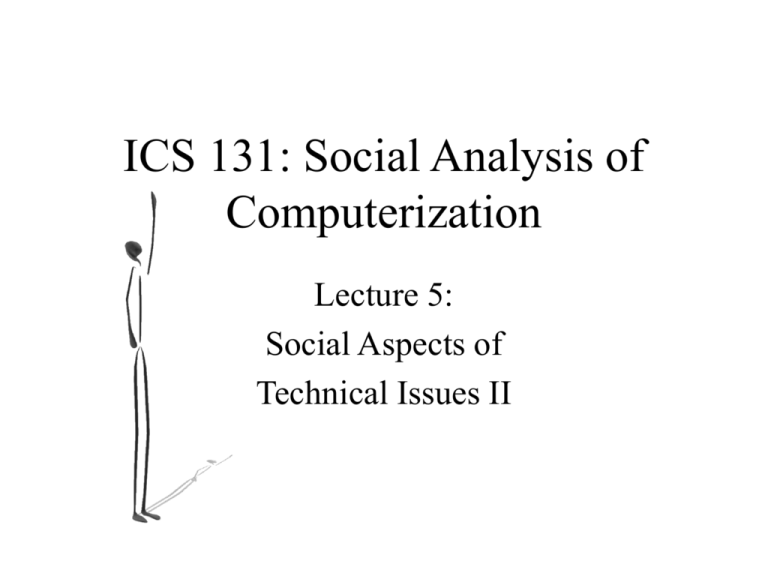
ICS 131: Social Analysis of Computerization Lecture 5: Social Aspects of Technical Issues II Announcements • First set of short assignments ready for pickup. Feedback on first set of short assignments • On the whole, good. • Summaries - not just rephrasing of abstract/conclusion. • Also, make sure to tie second paragraph back to the reading. • Technical points - please staple the papers, have the summaries in the correct order, spell check first, include student ID. Comments • If students agree/disagree with the author, they should be specific on the idea/issue being contended, and also explain why they agree/disagree, rather than just stating it in general. • If students make a claim, they should try to explain/justify their claim, rather than just stating it. • Ferris - Lots of people referred to the author as "he" when a quick Google search would have turned up the opposite. • In a few cases, either the Simon or Slashdot (more often) summary was missing entirely. • Insulting the author's intelligence is rarely part of a good critique. • Reaction paragraphs should respond to the substance of the topic, rather than the writing style. General Questions? • Also, specific questions can be asked in the discussion section. A Note on Subjectivity • The topics of this course are very subjective. • Each of you will have your own opinion. • The goal is to have a *well considered* opinion, and be able to argue for (or against) that (and other) opinions. Long Paper Assignment • The first longer paper for ICS 131 will give you the opportunity to analyze the social aspects of a recent technical innovation. Please pick a technology that has been popularized within the last ten years, briefly describe the technology, and analyze the goals, assumptions, stakeholders and impacts of the technology. The paper should be approximately 1500-2000 words in length. Using the UCI Library and its online resources, you should find at least three papers, articles or other sources that relate to the topic and cite them in the body of your paper using the ACM style. At least one of these sources should not be an online source, but rather one that you found in the library itself. You are encouraged also to reference any readings that have been assigned for this course that are appropriate to the topic you choose; however, there must be at least three references that are not part of the course readings. The paper should use standard formatting – Times style font size 12 or Arial/Tahoma style font size 10, 8.5x11 in. paper, 1” margins. Long Paper Assignment • A draft of the paper is due in class on Thursday, April 27. This draft should be the full 1500-2000 words in length, and should cover all of the above issues. This draft will be commented on and returned to you at least a week before the final paper is due. This draft will count for 30% of the overall grade for the paper. • The final paper is due in class on Thursday, May 11. The final version should reflect any changes suggested in the comments made on the draft. Follow-up from last week Canada (2001 Census Information) Source: http://www12.statcan.ca/english/census01/Products/Analytic/ companion/rel/contents.cfm - Total Population: 30,007,094 - African: 2.2% - Latino/Hispanic: .7% US (Source: US Census 2000) - Total Population: 281,421,906 - African: 12.3% - Latino/Hispanic: 12.5% 11.3% African American 11.4% Latino/Hispanic Follow-up from last week • Among the 1999 recipients of computer science bachelor degrees from Ph.D. granting institutions in US & Canada, only 4% were African-American and 4% Latino/a. Such low numbers are found elsewhere, as African-American and Latino/a students together make up less than 7% of the high school advanced placement computer science testtakers nationwide. In 1999, only 7 California AfricanAmerican female high school students took the AP CS exams (out of a total of 455 female test takers), 24 AfricanAmerican males (out of 2501 males), 21 MexicanAmerican females and 52 Mexican-American males. Source: http://www.tcla.gseis.ucla.edu/divide/politics/margolis.htm l Today • Software usage • Networking Today • Software usage • Networking Key Ideas • Many factors affect how people adopt and use software packages beyond the functionality of the software itself. • Understanding these additional factors can help you make software that works well and is used by a lot of people. How today is different from the lecture on code (last week)… • The code lecture was primarily about how/why people write code. • This lecture is primarily about how/why people use code. Trying something vs. adoption • Factors that influence how someone first undertakes a certain behavioral pattern (such as software use) do not correlate fully with factors that determine whether or not that behavioral pattern becomes habitual. Structure • • • • • Topic What it means Good part Bad part (Note: I’ll just be giving examples. You should be able to think of many more for each topic.) Factors that Affect Whether People Try a Software Package • • • • • • Advertising Word of Mouth Bundling Expected Functionality Social Implications Access Advertising • Learning about it from TV/Radio/Product Placement/magazines/etc. • Good part - expose willing purchasers to content that will make their lives easier/better. • Bad part - paid for by companies who are legally obligated to increase shareholder value, rather than to make purchasers lives easier/better. Word of Mouth • Learning about something from friends, family, etc. • Good part - trusted source, first-hand experience • Bad part - Limited scope, since people only share what they already know with people they already know. (Works fairly well coupled with people’s exploration of software functionality.) Bundling • Comes pre-installed on a computer. • Comes with another software package that the person actively acquires. • Good part - Exposes people to software for which they may have a use, or that integrates well with other packages. • Bad part - Increases cost/size of software package you actually need. Distraction. Expected Functionality • Derived from advertising, word of mouth, packaging. • Good part - helps people use things the right way • Bad part - Largely limited by what people already know or can learn in 30 seconds or less. Social Implications • Will this make me cool/efficient/effective? • Will it allow me to integrate with other people like me? • Good part - allows people to reflect their personality in their software choice • Bad part - may not correlate with greatest functionality (“This is the way we’ve always done it around here!”) Access • Is it in the right language? Is it made for the correct platform/OS? Can I afford it? Do I have the necessary capabilities (net, etc.)? Is it available for purchase near me? Can I try a demo? Does it integrate with my lifestyle? • Good part - Makes coding easier/cheaper when it doesn’t have to be universally accessible. • Bad part - Makes fewer (and less diverse) people able to use it. Adoption • Many of the same factors apply again here, but also… – Usability – Functionality – Unexpected Benefits Usability • Can I get things done in an efficient and enjoyable manner? • Design - Herbert Simon - producing preferred situations (is it better than the old way?) Functionality • Is the real functionality as good as (or better than) the expected functionality? Unexpected Benefits • E.g., Roomba as cleaning partner Startup Cost of a New Technology • Both a barrier to adoption and a cause of irrational persistence. Combining software packages • Source of originality/complexity • Suites - made to work together Today • Software usage • Networking Today • Software usage • Networking Key Idea • Computing underwent a significant social shift as computers moved from being primarily self-contained to primarily networked. Before the 1990s • Computing – – – – Business Academics Games Hobbies After the 1990s • Communicating – Email – WWW – Networked games • (as well as computing) Ease of Information Exchange • Benefits? Ease of Information Exchange • Drawbacks? Increased Complexity • Benefits? Increased Complexity • Drawbacks? Information Overload • The rise of search technologies – Yahoo – Google • Previous search technologies – – – – Social Networks Librarians Card catalogs Others? Communication • • • • One to one - conversation One to several - storytelling One to many - broadcasting Many to many - WWW Practice Quiz • (Not a real one… just a warm-up for today.) • Snowy Tree Crickets are surprisingly bad at synchronizing with each other. True or False? • Raise your hand if you think you know the answer. Practice Quiz 2 • List three metaphors that are commonly used regarding computer systems. • Raise your hand if you think you know the answer. Topic for Discussion • Pick a software package of your choice. • Question: – Aside from functionality, what factors of that software influence its distribution and adoption? • Discuss with neighbors - 5 minutes. Today’s guest speakers are... LINDSEY, DANIEL STEPHEN MAZZOCCO, DAVID STUART ALLRED, SCOTT M. CHEN, ALEXANDER TSU HAW HO, TED MACHADO, JOE ERIC MADDALONI, PAUL ANTHONY PHAN, ANH NHAT TETREAULT, MONIQUE MARIE YUN, JING HUI GEE, JEFFREY DOUGLAS …come on down front! Thursday’s class Ethics and Reliability Readings Baase, Ch. 10 Dill et al.

